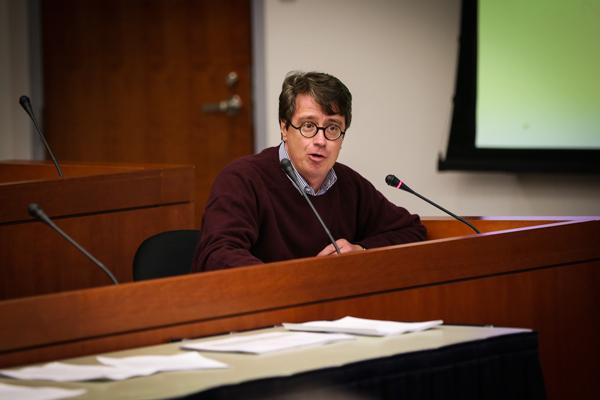Some faculty are “outraged” by GW’s new health care plans, which they say limit their options and force them to take on expenses that the University should cover.
The two plans offered for 2017 could result in some faculty contributing up to 10 percent extra out of pocket for medical expenses, and others would have $1,000 increases to their deductibles. Faculty members, including those who are a part of the Benefits Advisory Committee – a team of faculty and staff who provide feedback on benefits to Human Resources – have said they are not satisfied with the new plans and were not consulted enough on them.
Last year the University offered three plans to employees: basic and medium preferred provider organization plans and a high-deductible health plan. This year, faculty and staff will choose between the GW PPO plan – a merger of the basic and medium plans – and a high-deductible plan that has been modified and rebranded as a savings plan.
University spokeswoman Maralee Csellar said administrators are making sure faculty and staff members understand the upcoming changes.
“We will also continue to discuss with the BAC and senior leadership in the coming months about having a well-rounded group of representatives from all of our employee categories to help give us additional input on benefit planning,” Csellar said.
The BAC is tasked with providing feedback to administrators about University employees’ thoughts on the proposed changes, but it has no deciding power when it comes to making the changes.
Benjamin Hopkins, an associate professor of history and international affairs, said in an email that the University is “short-changing” its employees on benefits.
The University currently maintains a 3 percent cap on how much they will increase benefits spending from year to year. Faculty said the cost of health care nationwide increases by about 6 percent each year, leaving a 3 percent gap.
“The University is only increasing its health care funding by 2.2 percent this year, which is well below the rate of inflation for health care,” Hopkins said in an email.
Earlier this year, the Faculty Senate unanimously passed a resolution to provide more funds to GW faculty and defray the costs of health insurance.
Tyler Anbinder, a professor of history and a member of the advisory committee, said it seems the University is moving in the direction of offering only one high-deductible plan.
“A couple of years ago there were four options, and then it went down to three, and now to two, and faculty now expect it to eventually become one,” said Anbinder. “They’re doing everything they can to make the plan more enticing because it is the least costly plan for the University.”
This year officials increased the amount that the University contributes to individuals’ health savings accounts, Anbinder said. The health savings plan allows employees to open a health savings account where they can put money from their income, before taxes have been deducted. The University also contributes to the account, matching employee contributions up to $1,200 this year, up from last year’s $600. But the new plan raised the deductible for the family plan by $1,000.
Issues with health savings, however, are just one of faculty members’ general concerns, Anbinder said.
“You can’t point to any one thing – it’s really hard,” Anbinder said. “That’s why what we’ve been more focused on the total amount the University spends.”
Csellar said there was no change from last year in the number of meetings held before a final vote. But faculty said they were not given enough time to consult with their colleagues about the potential effects of the new plans in order to make a fully informed decision.
Changes to benefits are made in alignment with the calendar year: Data about how the plans are used is collected between January and April. Over the summer, changes for the next year are discussed and decided, and open enrollment for the following year begins in October. There is no policy in place mandating that changes must be made from year to year.
The Faculty Senate will hold its first meeting of the year Sept. 9, and faculty said they will likely propose a resolution to change the benefits decision-making process.
Harald Griesshammer, a physics professor and a member of the Faculty Senate, said that maintaining a healthcare plan for more than one year would allow the University to more accurately see how the plans affects subscribers, particularly those who depend on coverage to treat chronic illnesses and disabilities.
Griesshammer said the quick turnaround on the decision, which happened over the summer when many faculty were away from GW conducting research, made some faculty members feel they were forced to approve changes without being fully familiar with them.
“There was no need to rush this,” he said. “This could have waited for a year. We might have paid a little bit more this year, but I don’t think that anybody would mind paying a little bit more if it buys us time to do something with deliberate haste instead of being rushed. People were made to either agree to the changes, or they were still going to be implemented.”
But the biggest victims of the changes, Griesshammer said, are staff members, not faculty. He blamed turnover in some offices on declining benefits, saying that employees like administrative assistants have a record of moving to positions elsewhere in D.C. where they can get better coverage.
“Healthcare is a tremendous issue for people who make way less money than the average university professor,” Griesshammer said. “For GW, this is an issue of corporate identity, it’s how we treat people who work for and with us.”








